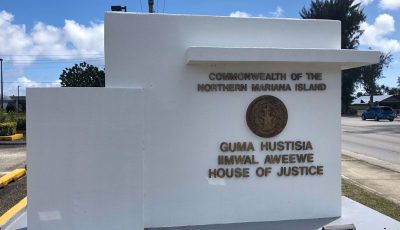High court stays sanctions order against Weintraub
The CNMI Supreme Court has put on hold for 14 days a judge’s ruling that sanctioned government lawyer Betsy Weintraub for her handling of the sexual abuse case of a retired Army reservist.
In an order last Sept. 20, Associate Justice Perry B. Inos said the high court is staying Superior Court Associate Judge Teresa Kim-Tenorio’s order due to the possibility of irreparable harm to Weintraub, who is an assistant attorney general.
However, Inos said, the high court will consider no additional stay unless Weintraub meet the high court’s procedural requirements.
Inos said that pursuant to NMI Supreme Court rules, once a party has filed an appeal, it must first move the Superior Court for a stay of the judgment or order pending appeal unless doing so would be impracticable.
Here, Inos said, Weintraub prematurely moved for a stay pursuant to NMI Supreme Court Rule 8(a) in the Superior Court, as the notice of appeal had not been filed in this court at the time the motion for stay was filed in the Superior Court.
Because Weintraub has now filed a notice of appeal, she must either file a new motion for stay in the Superior Court pursuant to NMI Supreme Court Rule 8(a)(1); or file a motion for stay in the Supreme Court explaining why moving first in the Superior Court would be impractical, pursuant to Supreme Court Rule 8(1)(2), Inos said.
Inos said if Weintraub files a motion with this court, it must conform with NMI Supreme Court Rule 27, which requires, among other things, to “state with particularity the grounds for the motion, the relief sought, and the legal argument necessary to support it.”
Last Sept. 6, Associate Judge Kim-Tenorio sanctioned Weintraub with an order to donate $500 to a non-profit organization on Saipan dedicated to helping minor victims of sexual assault.
On Sept. 19, the Office of the Attorney General and Weintraub filed a motion to stay Kim-Tenorio’s order, arguing they intended to file an appeal.
At 8:39am last Sept. 20, Kim-Tenorio denied Weintraub’s motion to stay. At 2:55pm that same day, Weintraub and the OAG filed their notice of appeal and an emergency motion to stay Kim-Tenorio’s order.
In a written order about the sanction, Kim-Tenorio stated that Weintraub’s unprofessional conduct and violations of Model Rules of Professional conduct were not isolated incidents, but occurred continuously throughout litigation in the case against Michael Murphy due to her lack of preparation and diligence.
Kim-Tenorio said the cumulative weight of Weintraub’s conduct and violations has wide reach and directly affects multiple government agencies, the public, and the alleged victim and Murphy.
In the government’s motion to stay, Attorney General Edward Manibusan said the appeal raises serious constitutional questions regarding the separation of powers and due process.
Most importantly, Manibusan said, Weintraub’s civil rights are at stake.
Manibusan asked the trial court to stay the sanction pending appeal, saying that Weintraub faces irreparable injury if the Superior Court does not stay the proceedings, and the balance of hardships tips sharply in Weintraub’s favor.
In the alternative, he asked the trial court to issue an order delaying execution of the judgment for 60 days to allow the government time to file a motion to stay before the Supreme Court and give the high court time to make a ruling.
In her order denying the government’s motion to stay, Kim-Tenorio found the government’s arguments not persuasive.
Kim-Tenorio said even if the government had binding legal authority or support to determine that the order to show cause hearing and orders constituted a sanction, the government’s argument attempts to impede the court’s inherent power to control its docket by asking probing questions during hearings.
Kim-Tenorio acknowledged that every potential rule violation is not specifically listed, but the government falls short of providing the court with binding authority mandating a specific list of all potential violations, absent context.
Kim-Tenorio said she is not persuaded by the government’s argument that the imposition of a $500 sanction encumbered Weintraub’s license as prohibited by the Supreme Court.
The judge said the government failed to provide any legal authority or case law to support the argument that a non-refundable donation is analogous to irreparable harm.
“Moreover, harm to Ms. Weintraub’s reputation may be vindicated by a successful appeal,” Kim-Tenorio pointed out.
On the issue of serious questions of law, Kim-Tenorio said the exercise of judicial discretion pursuant to Rule 48(a)’s “leave of court” requirement does not violate the doctrine of separation of powers.
Last Aug 15, Kim-Tenorio granted Weintraub’s motion to dismiss without prejudice the sexual abuse charges against the 54-year-old Murphy. That means the government can re-file the case in the future.



























